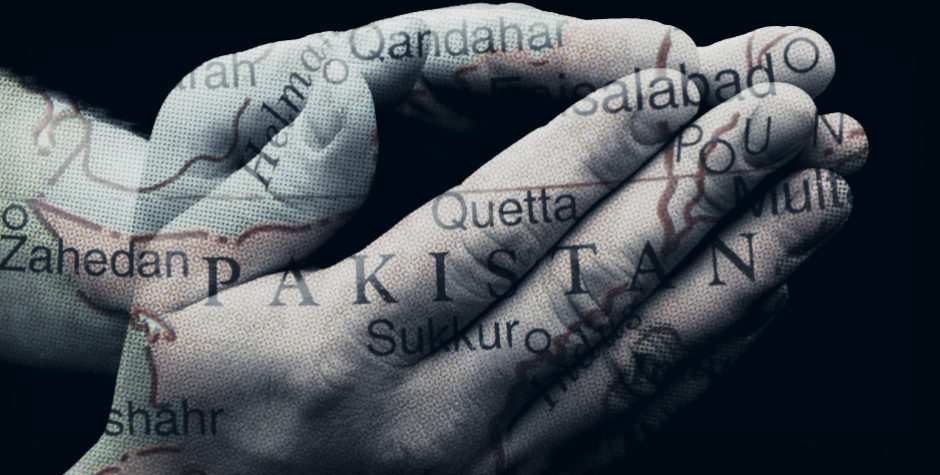ECLJ Pleads With the United Nations on Behalf of a Young Christian Girl in Pakistan
Recently, we informed you that we filed a critical submission with the United Nations Human Rights Council highlighting three major legal issues concerning Christian persecution in Pakistan. The first issue raised in our report was regarding blasphemy laws, as discussed here. If we look at the sheer number of the people affected, the second issue we raised in our report is perhaps an even bigger problem.
According to a study, about 1000 young Christian and Hindu girls are forced to convert to Islam and marry Muslim men every year in Pakistan. While the Pakistani government has pledged to investigate and provide justice in such cases, not much appears to be happening.
In most cases, these girls (who are minors) are brought to courts where they testify that they converted to Islam and married Muslim men of their own free will. Courts rely on those statements without any investigative mechanisms to ascertain whether such statements are freely given, and they refuse to give custody of the girls to their parents. Courts further rely on a girl’s statements about her age over her conflicting birth certificate. Even if there is no conflict between the two, courts rely on Islamic law in which a girl is no longer considered a minor if she has reached puberty, at which point she is free to marry.
In refusing to give custody of the young girls to their parents in conversion/marriage cases, courts disregard Pakistan’s Majority Act, 1875, which provides that the age of majority is 18. The courts also disregard the Child Marriage Restraint Act that defines a female “child” to be under 16 years of age. Moreover, the Child Marriage Restraint Act itself is insufficient as it does not invalidate child marriages; it only provides minor punishments for individuals who perform a child marriage. But even that provision is rendered void if the girl has reached puberty, and thus, is not considered to be a child anymore.
In our report to the U.N. we discussed the case of Mehak James, a 14-year-old Christian girl who disappeared from her home in September 2020. In most conversion/marriage cases, girls are at least found and brought to court. However, in this case, young Mehak has not ever been produced before a court. She has simply vanished, and the Pakistani authorities have literally done nothing to find her. We reported this case to the U.N. after Mehak’s parents, James and Yasmeen Masih, and our affiliate’s attorneys in Pakistan exhausted every possible avenue except the Supreme Court of Pakistan. We asked the U.N. Human Rights Council to urge Pakistan to comply with its national and international obligations and provide justice.
We informed the Council that, on September 18, 2020, James and his wife left for work in the morning, leaving Mehak and her brother at home. A few hours later, their son called James and said that Mehak went out of the house and had not returned. James and Yasmeen went home and began searching for her in the neighborhood.
James went to the local police, who did not initiate a search or take any action. Two days later, James obtained Mehak’s phone record and discovered that their next-door neighbor, Muhammad Adnan, a 45-year-old Muslim man and father of four children, had been communicating with Mehak. There were over 40 calls and several SMS messages on Mehak’s phone from Adnan, beginning two days prior to her disappearance. There were also 11 calls from another number registered to a Muslim woman who lives in another city and is unknown to Mehak’s family.
James took this information to the police. Initially, the police were not even willing to begin searching for Mehak or investigate Adnan. After some people from the neighborhood got involved, the police finally arrested Adnan. However, a few days later, the investigating officer, Muhammad Shafiq, called James to the police station and forced him to provide an affidavit exonerating Adnan. When James refused, officer Shafiq told James that if he would sign the affidavit, the police would find his daughter. James signed the affidavit believing it would help him get his daughter back. Adnan was granted bail, but the officer did not honor his word and refused to do anything to find Mehak.
Our affiliate’s office filed a petition in the court, seeking an order against the police to recover Mehak. Referring to James’ affidavit, which is not legally relevant to the court’s power to order a proper investigation to find Mehak, the court denied the petition. Our affiliate’s office then filed an application to cancel Adnan’s bail, informing the court of how the affidavit was obtained under duress and false promises. The court dismissed that application as well. Our affiliate’s office then filed an application with the Inspector General of Punjab (IG), who directed the lower officials to appoint a new investigating officer. Despite the directive from the IG, however, the new investigating officer also refused to investigate Adnan, saying that the court granted him bail, so he could not be investigated further.
It has been almost one year, and young Mehak is still missing. The Masihs do not know if their daughter is alive, has been sold into prostitution, or has been forced to convert to Islam and marry a Muslim man. Meanwhile, the 45-year-old man who was inappropriately in repeated contact with Mehak on and around the day of her disappearance is free with impunity, and no investigation is being done.
Our affiliate on the ground has just filed a constitutional petition with the last forum left—the Supreme Court of Pakistan. We hope that the Supreme Court will see the injustice done in this case and order an immediate and proper investigation to recover Mehak.

